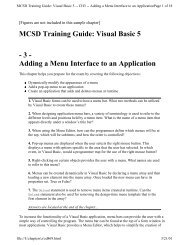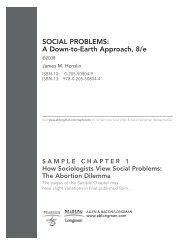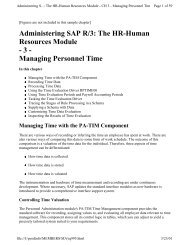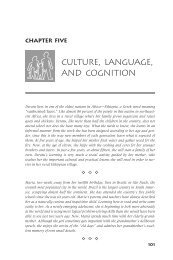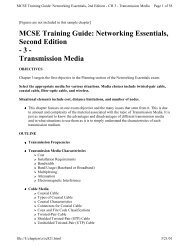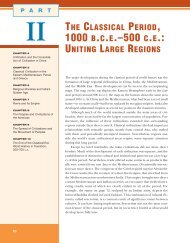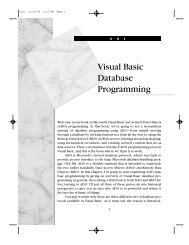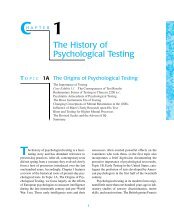Asian Philosophies JOHN M. KOLLER - Pearson
Asian Philosophies JOHN M. KOLLER - Pearson
Asian Philosophies JOHN M. KOLLER - Pearson
You also want an ePaper? Increase the reach of your titles
YUMPU automatically turns print PDFs into web optimized ePapers that Google loves.
KOLLMF01_0131951831.QXD 26/6/06 4:16 PM Page xvii<br />
Introduction xvii<br />
a Hindu perspective, these paths of self-discipline are simply the philosophical<br />
wisdom of the ages being put into practice by the people.<br />
There has also been widespread agreement concerning the importance<br />
of living morally, fulfilling one’s moral duties, especially the duty to avoid<br />
hurting other living beings. At least part of the reason why living a moral life<br />
is so important is the widespread agreement that all human actions are governed<br />
by the principle of karma, which says, roughly, that because every<br />
action inevitably produces its effects, therefore it is our actions that make us<br />
the kinds of persons we become. To become good we must engage in morally<br />
good actions. Performing bad actions will make us into bad persons. Jainism,<br />
a tradition more than three thousand years old, epitomizes the importance<br />
of conjoining the ways of virtuous living and yogic meditation in order to<br />
overcome human suffering.<br />
According to Buddhism, a tradition that originated in India twenty-five<br />
hundred years ago, the basic problem of life is that of overcoming suffering.<br />
The essential teachings of the Buddha revolve around questions being asked<br />
by many thinkers of his time, namely, What is suffering? On what conditions<br />
does it depend? How can these conditions be eliminated? What path should<br />
one follow to eliminate suffering?<br />
These questions led to inquiries into the nature of the self that suffers<br />
and the causes of suffering, giving rise to philosophical views of self and reality.The<br />
problems of justifying the claims made about the nature of the self and<br />
the nature of reality led, in turn, to theories of logic and knowledge. The problem<br />
of how to overcome suffering led to the development of understanding<br />
about morality and mental discipline and a new understanding of consciousness.<br />
Thus, the eminently practical problems of finding ways to overcome<br />
suffering provoked the reflections that constitute Buddhist, Jain, and Hindu<br />
philosophical traditions.<br />
EAST ASIAN PHILOSOPHIES<br />
The three enduring philosophical traditions of East Asia are Confucianism,<br />
Daoism, and Buddhism. Confucianism, which began with the teachings of<br />
Confucius in the sixth century BCE, incorporated important features of competing<br />
traditions, such as Legalism, Moism, the School of Names, and Yin Yang<br />
thought, as it developed. Daoism, with its emphasis on nature and spontaneity,<br />
began at about the same time and provided a counterbalance to Confucian<br />
thought. It also provided much of the philosophical framework and vocabulary<br />
necessary for Buddhism to take hold in China, where it become the third great<br />
philosophical tradition fifteen hundred years ago.<br />
Before the development of Chinese Buddhism, philosophical thought<br />
was concerned primarily with the ways of moral, social, and political life or with<br />
understanding the ways of nature. The central problems of Chinese philosophy<br />
are reflected in the Confucian question, How can human beings and human<br />
society achieve their fullest possible development? and in the Daoist question,<br />
How can humans achieve harmony with nature? Some two thousand years ago,<br />
Confucianism became the official ideology of China, with Confucian writings





